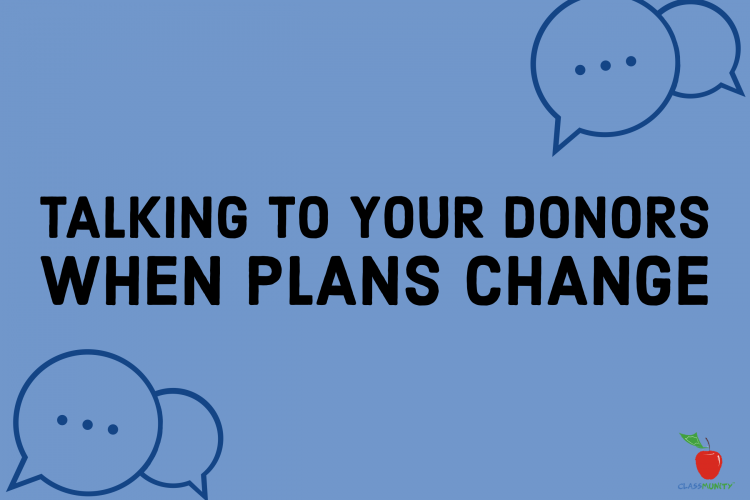Even with the best planning not all fundraisers will go off without a hitch. Sometimes the plans must change or even be cancelled. Other times you didn’t reach your fundraising goal, or you need taking the project in a different direction. If this this happens after you have collected funds it can lead to some difficult conversations with donors. You may get questions about refunds or what you will be doing with the funds. But with a little bit of planning, you can easily navigate talking to your donors when plans change.
What to do when a specific project or trip is cancelled:
Let’s say you raised the funds for a specific project or trip, and now it is no longer taking place. You have a few options:
-
Roll the funds over.
- Communicate to your donors that you would like to use the funds raised for the next opportunity your organization can attend the competition or complete the project.
-
Redirect the funds.
- Communicate to your donors that you would like to use the funds raised to do a new project that still benefits the organization.
-
Honor Tickets for rescheduled event.
- If you will be holding your event the following year (for example: annual gala, golf outing, etc.) honor tickets sold for the future event!
- Encourage Converting Refunds to Donations
- If an event is cancelled, consider encouraging donors to allow the funds from their ticket purchase to be converted into a donation to the organization instead of receiving a refund.
What to do when a general fundraiser is cancelled:
If you are running a general fundraiser for your organization and it is cancelled, the key thing to remember is to communicate with your donors.
-
Update Your Donors
- Let them know what is happening, and keep them in the loop to eliminate questions. For example, if you decided to postpone, change delivery method, etc make sure you provide details to your donors to help them feel confident with the changes and with your fundraiser.
- Let them know what is happening, and keep them in the loop to eliminate questions. For example, if you decided to postpone, change delivery method, etc make sure you provide details to your donors to help them feel confident with the changes and with your fundraiser.
-
Give Donors a Deadline for Donations
- Make sure to clearly communicate the deadline for donations, especially if the deadline or method for collecting donations changes. For example if you will ending your fundraiser early, give your donors a few days notice and emphasize when their last chance to participate will be.
- Make sure to clearly communicate the deadline for donations, especially if the deadline or method for collecting donations changes. For example if you will ending your fundraiser early, give your donors a few days notice and emphasize when their last chance to participate will be.
Preparing for the Unexpected – Tips for Every Fundraiser:
-
Build in a Disclaimer for every Fundraiser
- If you are able to, clearly state what the plans will be if you do not reach your goal or the event is cancelled can help take the guesswork out of it for your donors. Will you issue refunds or will the funds roll into the next attempt at reaching your goal? This can be really important for large capital projects.
-
Communicate How to Get a Refund
- Post your refund policy on your fundraising page. For example, if you’re selling tickets to an event, what happens if your donor cannot make it? If you will be unable to refund any donations, you should communicate that. Otherwise, clearly state the donation policy to save future headaches.
The key is to have clear communication about what you will be doing when the plan changes. Work with your donors to preserve the effort you put into your fundraising by pivoting to reduce the number of refunds that are requested.

Leave a Reply